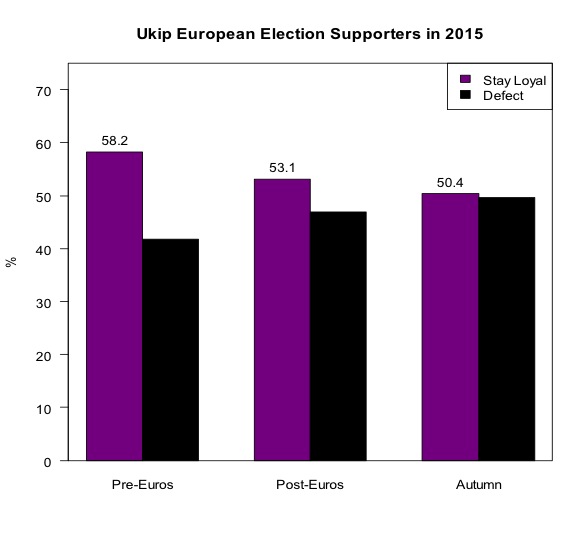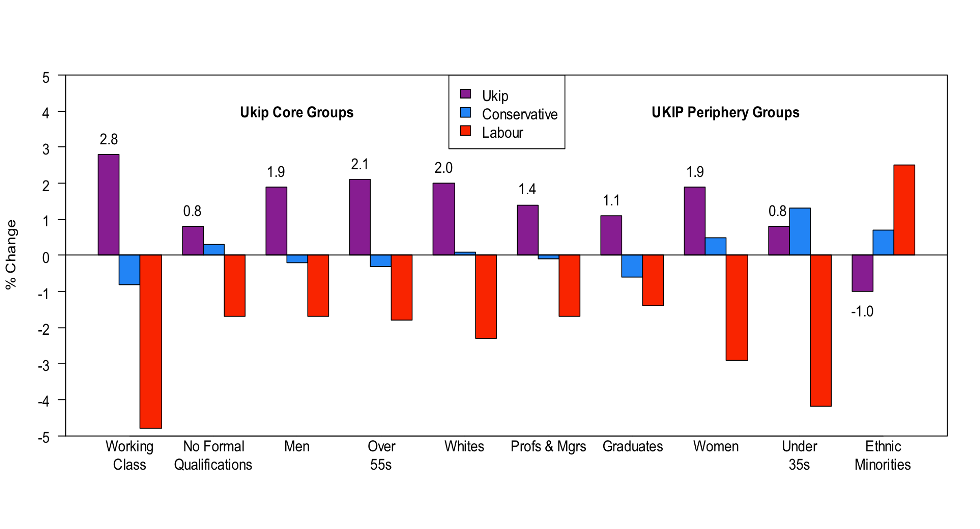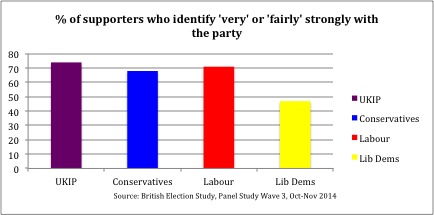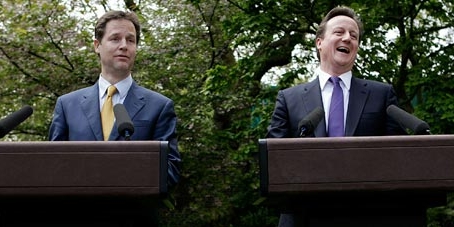
New political parties, it was once said, can shoot up like a rocket but come down like a stick. Since its sharp rise from 2010 the UK Independence Party (Ukip) has been described in similar terms; a protest party that has captivated our attention but which is unlikely to remain on the political landscape. In this post, James Dennison, Matthew Goodwin and Caitlin Milazzo question this assertion by analysing survey data from the British Election Study. They show that a considerable proportion of those who voted for Ukip in the European Parliament elections are also likely to vote for them in the general election. Additionally, they show that Ukip continues to attract a base of socially distinctive ‘left behind’ voters, and that many of these voters identify strongly with the party.
Nigel Farage and Ukip might have won the European Parliament elections in May, and two parliamentary by-elections in Clacton and Rochester and Strood, but they do not have sufficient ‘staying power’ to remain as a significant political force. Thus one commentator concluded: ‘I doubt now that Ukip will ever establish itself as a serious force. There simply isn’t the time before the general election, and after the election everything will be different’.
But to what extent, if at all, is this true? With less than five months until the 2015 general election, is Ukip likely to fall out of the sky like a stick or might the party be attracting a more durable following?
To explore the nature of public support for Ukip we can draw on the latest data from the British Election Study (BES), one of the most reliable sources of data on elections and voting. We are exploring these data for a forthcoming book on the 2015 general election, which also draws on more than 100 interviews with party strategists and organizers. So what do these data reveal?
In the aftermath of the European Parliament elections many commentators suggested that this marked ‘peak Ukip’, and that the party would soon disintegrate as attention turned to the 2015 general election. There were good reasons to take this view; within three months of the European Parliament elections in 2004 and 2009 Ukip had slumped back to less than 5 per cent in the opinion polls. But this has clearly not happened. If anything, Ukip has gained momentum.
The number of prospective voters in the BES who intend to cast their ballot for Ukip in 2015 increased from 11.2 per cent in March to 15.8 per cent in November. This latter figure is more than two-fold higher than the equivalent figure for the Liberal Democrats and is around twice the level of support that Ukip need to have a significant impact in May. And this reflects an underlying story about the loyalty of Ukip’s support.
The British Election Study allows us to explore whether people who voted for Ukip at the 2014 European Parliament elections also plan to vote for Ukip in 2015. The chart below presents this story. The percentage of Ukip voters in 2014 who planned to stay loyal to Ukip before the European Parliament elections was 58 per cent; it then declined slightly to 53 per cent afterthese elections, and then to 50 per cent in the most recent wave of BES data from September and October. Put another way, approximately one out of every two voters who supported Ukip at the European Parliament elections are intending to also vote for Ukip next May. The main parties might take comfort from the fact that this loyalty appears to be in decline but their strategists will also know that the rate of decline leaves Ukip with more than enough support to have a significant impact on the outcome in May.
Where are the defectors – the other 50% – going? In the latest wave of the BES 24% of Ukip’s voters in 2014 are planning to switch to the Conservatives in 2015, 11% are planning to vote for Labour, 1% Liberal Democrat and 11% are still undecided. This suggests that Ukip could retain more than half of its voters from the European Parliament elections and is not following the same pattern of rapid decline that we saw ahead of general elections in 2005 and 2010.
Ukip’s greater ‘staying power’ is underlined by the social profile of its base of supporters. In Revolt on the Right, Robert Ford and Matthew Goodwin showed how between 2004 and 2013 Ukip established a base of financially struggling, ‘left behind’ voters who tend to be older, white, male, poorly-educated, working-class and who in earlier years might have voted Labour.
More recent analysis of the backgrounds of Ukip supporters corroborates this argument, showing how Ukip is winning over disaffected Labour voters who gave up on Labour in the early 2000s, perhaps ‘stopped off’ with the Conservative Party in 2010 and then defected to Ukip. ‘To some degree’, note these authors, ‘what Ukip are doing is picking up already disaffected former Labour voters from the Conservatives and elsewhere’.
That Ukip is continuing to attract a socially distinctive base is revealed in the BES. The chart below shows the change in the percentage of respondents who plan to vote for Ukip in 2015 between the pre-European election wave of the BES and its most recent autumn wave. With the exception of ethnic minorities Ukip has experienced growth across a wide range of groups although the party continues to advance most strongly among its core ‘left behind’ electorate. For example, this year Ukip increased its support among the working class by 2.8 percentage points but only increased its support among under 35 year olds by 0.8 per cent. In fact Ukip is the only party for whom a majority of supporters are over 55 years old.
Aside from being socially distinct, those who support Ukip also feel more strongly attached to the party than some might expect. This ‘party identification’ is important as when a political party attracts ‘strong identifiers’ it stands a better chance of retaining support and mobilizing support on election day.
In the latest wave of the BES 22 per cent of Ukip supporters identify ‘very strongly’ with Ukip, the same as the equivalent figure for Labour supporters and more than the 16 per cent among Conservative supporters and 8 per cent among Liberal Democrat supporters. If we combine those who say that their strength of support is ‘very strong’ or ‘fairly strong’, we see that Ukip have the most ardent supporters at 74 per cent, compared to 71 per cent for Labour, 68 per cent for the Conservatives and a mere 47 per cent for the Liberal Democrats.
Some analysts have noted that a relatively low percentage of voters who are planning to support Ukip in 2015 also identify themselves as strong supporters of the party, leading them to conclude that Ukip’s revolt might actually be fragile. But as a new and growing party Ukip, much like the Greens, attracts voters who might not yet describe themselves as supporters. Conversely, votes for Labour and the Conservative Party are largely confined to their strong identifiers. Another way of looking at this, then, is to suggest that Ukip has a fairly large base of identifiers, whom the party will need to transform into strong supporters if it is to transform its revolt into a longer-term insurgency.
Yet what remains clear is that Ukip’s current base of support is more loyal than in the past, remains socially distinctive and contains people who now identify strongly with the party. For all of these reasons Ukip may well have more staying power than is often assumed.
Note: This is taken from a presentation given to the BES’s conference, ‘Insights Into the 2015 General Election’ on 9 December 2014. It was previously published on the University of Nottingham’s Ballots and Bullets site.
 Matthew Goodwin is an Associate Professor of Politics at the University of Nottingham
Matthew Goodwin is an Associate Professor of Politics at the University of Nottingham
 Caitlin Milazzo is an Assistant Professor of Politics at the University of Nottingham
Caitlin Milazzo is an Assistant Professor of Politics at the University of Nottingham
 James Dennison is a PhD candidate at the European University Institute, Florence
James Dennison is a PhD candidate at the European University Institute, Florence










1 Comments